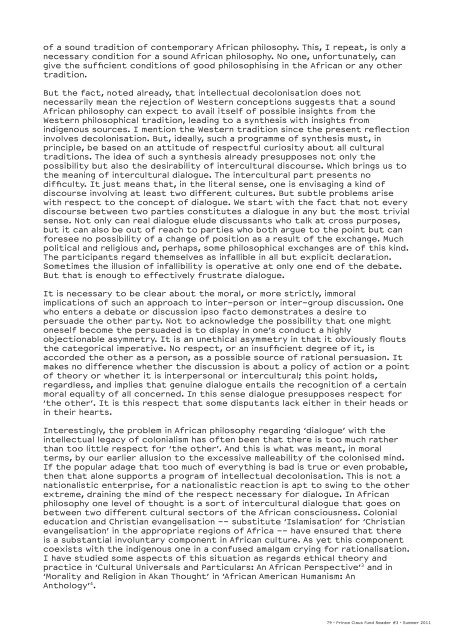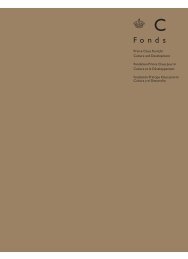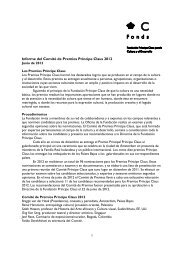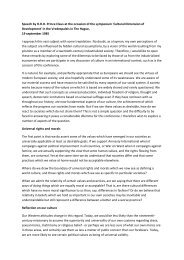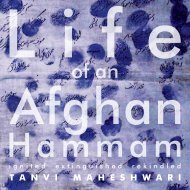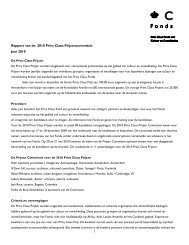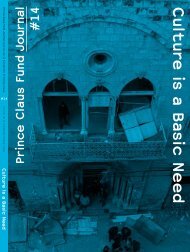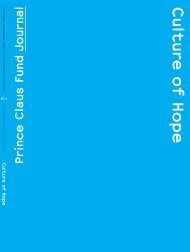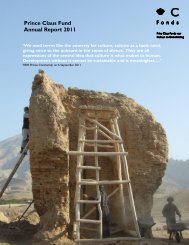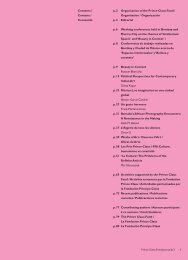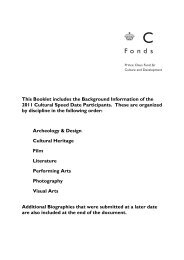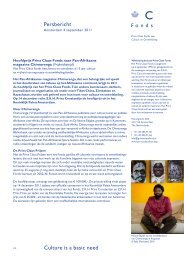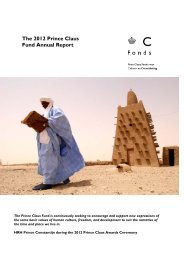3 summer 2011 - Prince Claus Fund
3 summer 2011 - Prince Claus Fund
3 summer 2011 - Prince Claus Fund
- No tags were found...
Create successful ePaper yourself
Turn your PDF publications into a flip-book with our unique Google optimized e-Paper software.
of a sound tradition of contemporary African philosophy. This, I repeat, is only anecessary condition for a sound African philosophy. No one, unfortunately, cangive the sufficient conditions of good philosophising in the African or any othertradition.But the fact, noted already, that intellectual decolonisation does notnecessarily mean the rejection of Western conceptions suggests that a soundAfrican philosophy can expect to avail itself of possible insights from theWestern philosophical tradition, leading to a synthesis with insights fromindigenous sources. I mention the Western tradition since the present reflectioninvolves decolonisation. But, ideally, such a programme of synthesis must, inprinciple, be based on an attitude of respectful curiosity about all culturaltraditions. The idea of such a synthesis already presupposes not only thepossibility but also the desirability of intercultural discourse. Which brings us tothe meaning of intercultural dialogue. The intercultural part presents nodifficulty. It just means that, in the literal sense, one is envisaging a kind ofdiscourse involving at least two different cultures. But subtle problems arisewith respect to the concept of dialogue. We start with the fact that not everydiscourse between two parties constitutes a dialogue in any but the most trivialsense. Not only can real dialogue elude discussants who talk at cross purposes,but it can also be out of reach to parties who both argue to the point but canforesee no possibility of a change of position as a result of the exchange. Muchpolitical and religious and, perhaps, some philosophical exchanges are of this kind.The participants regard themselves as infallible in all but explicit declaration.Sometimes the illusion of infallibility is operative at only one end of the debate.But that is enough to effectively frustrate dialogue.It is necessary to be clear about the moral, or more strictly, immoralimplications of such an approach to inter-person or inter-group discussion. Onewho enters a debate or discussion ipso facto demonstrates a desire topersuade the other party. Not to acknowledge the possibility that one mightoneself become the persuaded is to display in one’s conduct a highlyobjectionable asymmetry. It is an unethical asymmetry in that it obviously floutsthe categorical imperative. No respect, or an insufficient degree of it, isaccorded the other as a person, as a possible source of rational persuasion. Itmakes no difference whether the discussion is about a policy of action or a pointof theory or whether it is interpersonal or intercultural; this point holds,regardless, and implies that genuine dialogue entails the recognition of a certainmoral equality of all concerned. In this sense dialogue presupposes respect for‘the other’. It is this respect that some disputants lack either in their heads orin their hearts.Interestingly, the problem in African philosophy regarding ‘dialogue’ with theintellectual legacy of colonialism has often been that there is too much ratherthan too little respect for ‘the other’. And this is what was meant, in moralterms, by our earlier allusion to the excessive malleability of the colonised mind.If the popular adage that too much of everything is bad is true or even probable,then that alone supports a program of intellectual decolonisation. This is not anationalistic enterprise, for a nationalistic reaction is apt to swing to the otherextreme, draining the mind of the respect necessary for dialogue. In Africanphilosophy one level of thought is a sort of intercultural dialogue that goes onbetween two different cultural sectors of the African consciousness. Colonialeducation and Christian evangelisation -- substitute ‘Islamisation’ for ‘Christianevangelisation’ in the appropriate regions of Africa -- have ensured that thereis a substantial involuntary component in African culture. As yet this componentcoexists with the indigenous one in a confused amalgam crying for rationalisation.I have studied some aspects of this situation as regards ethical theory andpractice in ‘Cultural Universals and Particulars: An African Perspective’ 3 and in‘Morality and Religion in Akan Thought’ in ‘African American Humanism: AnAnthology’ 4 .79 · <strong>Prince</strong> <strong>Claus</strong> <strong>Fund</strong> Reader #3 · Summer <strong>2011</strong>


